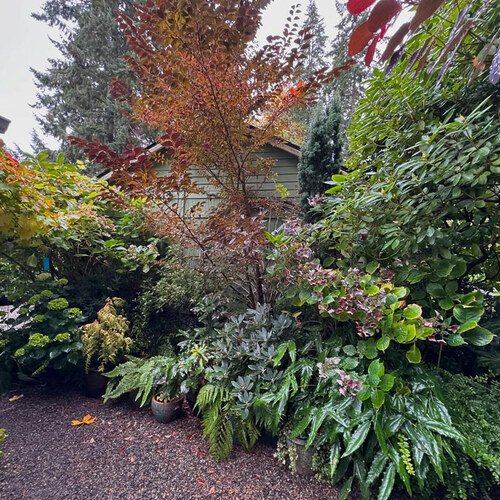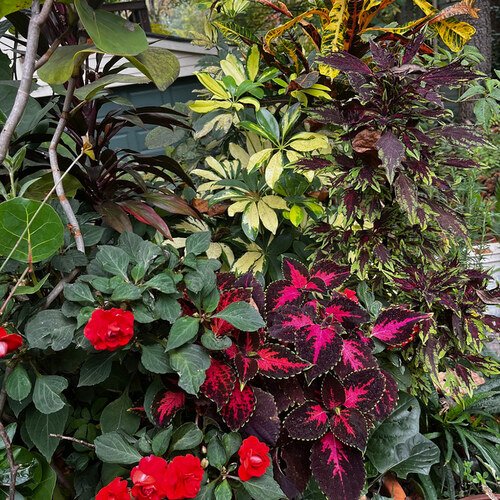
In the world of gardening, the
As Bill and Dawn share their story, we learn about their journey from raising livestock to operating a B&B, teaching, and finally focusing on their gardens. Their passion for gardening shines through in the colorful photos they share of their fall garden, filled with vibrant sumachs, large boulders, and majestic trees such as sugar maples and columnar English oaks.
The photos showcase the beauty and diversity of their garden, from the monolithic stones named Lewis and Connor to the line of cement spheres cutting through the lawn. Each image tells a story of the hard work and dedication that Bill and Dawn have put into creating this peaceful oasis on their farm.
One particular photo that stands out is the view down their farm lane, with burning bush, ginko tree, and a bit of Georgian Bay showing in the distance. It is a picturesque scene that captures the essence of their farm and the beauty of the fall season.
Despite their struggles to maintain the gardens in their old age, Bill and Dawn’s dedication to their craft is evident in every detail of Keppel Croft Gardens. The garden gate leading to “no where in particular” and the old hostas in large square pots are just a few examples of the unique touches that make this garden special.
As we admire the photos of their fall garden, we are reminded of the joy and peace that a garden can bring to both its creators and visitors. The ephemeral beauty of a garden may fade over time, but the memories and experiences shared within its walls will last a lifetime.
In conclusion, the
Location plays a significant role in gardening, as different climates and soil conditions can impact what can be grown successfully. Whether you are in a tropical paradise, a suburban neighborhood, or an urban apartment with a balcony garden, your location shapes your gardening experience. By sharing where you are located, you can connect with fellow gardeners who may be facing similar challenges or enjoying similar successes in their own gardens.
The length of time you’ve been gardening also influences your expertise and the depth of your knowledge. Some gardeners have been tending to their plants for decades, while others are just beginning their journey. Regardless of your experience level, there is always something new to learn and discover in the world of gardening. By sharing how long you’ve been gardening, you can inspire others to start their own garden or provide valuable insights to those who are just starting out.
Successes in the garden are worth celebrating, whether it’s growing a bountiful harvest of tomatoes, creating a beautiful flower bed, or attracting pollinators to your garden. These achievements reflect your hard work, dedication, and love for gardening. By sharing your successes, you can inspire and motivate others to keep pursuing their gardening dreams, no matter how big or small.
Failures are an inevitable part of gardening, but they also offer valuable lessons and opportunities for growth. Maybe you planted a crop that didn’t thrive, battled a pest infestation, or struggled to keep your plants alive during a drought. These setbacks can be frustrating, but they also teach resilience, patience, and the importance of adaptability in gardening. By sharing your failures, you can offer support and encouragement to fellow gardeners who may be facing similar challenges.
Hopes for the future in your garden can be a source of inspiration and motivation. Whether you dream of expanding your garden, trying new plants, or creating a more sustainable and eco-friendly space, your vision for the future reflects your passion for gardening and your commitment to nurturing the natural world. By sharing your hopes and aspirations, you can inspire others to dream big and strive for a more beautiful and sustainable garden.
Favorite plants are like old friends in the garden – they bring joy, beauty, and a sense of familiarity to your outdoor space. Whether you love the vibrant colors of roses, the delicate petals of orchids, or the fresh scent of herbs, your favorite plants reflect your personal taste and gardening style. By sharing your favorite plants, you can connect with fellow gardeners who share your love for these botanical treasures and exchange tips and advice on how to care for them.
Funny stories from the garden add a touch of humor and lightheartedness to the gardening experience. Maybe you accidentally planted a vegetable in the wrong spot, mistook a weed for a prized flower, or had a comical encounter with a curious critter in your garden. These moments of laughter and joy remind us not to take ourselves too seriously and to enjoy the unpredictable and whimsical nature of gardening. By sharing your funny stories, you can bring a smile to the faces of fellow gardeners and create a sense of camaraderie and shared laughter.
In conclusion, gardening is a journey filled with ups and downs, successes and failures, hopes and dreams, and laughter and joy. By sharing your gardening story – where you are located, how long you’ve been gardening, successes you are proud of, failures you learned from, hopes for the future, favorite plants, or funny stories from your garden – you can connect with a community of fellow gardeners who share your love for nature, beauty, and growth. So, grab your gardening tools, dig into the earth, and let your garden story bloom and flourish. Happy gardening! the benefits of practicing mindfulness.
Mindfulness is a practice that has been around for centuries, originating from ancient Buddhist traditions. In recent years, it has gained popularity in Western societies as a powerful tool for improving mental health and overall well-being. Mindfulness is the practice of being fully present and aware of one’s thoughts, feelings, and surroundings without judgment. It involves paying attention to the present moment and accepting it as it is.
There are many benefits to practicing mindfulness, both for mental and physical health. In this article, we will explore some of the key advantages of incorporating mindfulness into your daily routine.
1. Stress Reduction
One of the most well-known benefits of mindfulness is its ability to reduce stress levels. When we are constantly thinking about the past or worrying about the future, our bodies go into a state of stress, releasing cortisol and adrenaline into our bloodstream. This can lead to a variety of health problems, including high blood pressure, heart disease, and anxiety.
By practicing mindfulness, we can train our minds to focus on the present moment, which can help to reduce stress levels and promote relaxation. Mindfulness allows us to become more aware of our thoughts and feelings, allowing us to respond to them in a more constructive way. This can help to break the cycle of negative thinking and reduce the impact of stress on our bodies.
2. Improved Mental Health
In addition to reducing stress, mindfulness has been shown to have a positive impact on mental health. Research has found that mindfulness can help to reduce symptoms of depression and anxiety, improve mood, and increase feelings of well-being. By practicing mindfulness, we can become more aware of our thoughts and emotions, allowing us to respond to them in a more balanced and compassionate way.
Mindfulness can also help to improve our relationships with others. By being fully present and attentive in our interactions, we can cultivate deeper connections and better communication with those around us. This can lead to greater feelings of connection and empathy, which can improve our overall mental health and well-being.
3. Increased Focus and Concentration
In our fast-paced world, it can be challenging to stay focused and present in the moment. Our minds are constantly bombarded with distractions, making it difficult to concentrate on the task at hand. Mindfulness can help to improve our focus and concentration by training our minds to stay present and attentive.
By practicing mindfulness, we can learn to pay attention to our thoughts and feelings without becoming overwhelmed by them. This can help to improve our ability to concentrate on tasks, make decisions, and solve problems more effectively. Mindfulness can also help to improve our memory and cognitive function, making it easier to retain information and learn new skills.
4. Better Sleep
Many people struggle with sleep problems, such as insomnia or restless sleep. Mindfulness can be a helpful tool for improving sleep quality and promoting restful sleep. By practicing mindfulness before bed, we can calm our minds and bodies, allowing us to relax and prepare for sleep.
Mindfulness can help to reduce racing thoughts and worries that can keep us awake at night. By focusing on the present moment and letting go of stress and anxiety, we can create a sense of calm and relaxation that can promote better sleep. Mindfulness can also help to reduce the impact of sleep disorders, such as insomnia, by promoting a sense of relaxation and well-being that can improve sleep quality.
5. Increased Self-Awareness
Mindfulness can help us to become more self-aware and in tune with our thoughts, feelings, and emotions. By practicing mindfulness, we can learn to observe our thoughts without judgment, allowing us to gain a better understanding of ourselves and our inner workings.
Self-awareness can help us to identify negative thought patterns and behaviors that may be holding us back. By becoming more aware of these patterns, we can begin to challenge and change them, leading to personal growth and development. Self-awareness can also help us to cultivate a greater sense of self-compassion and acceptance, which can improve our self-esteem and overall well-being.
In conclusion, the practice of mindfulness offers a wide range of benefits for mental and physical health. By incorporating mindfulness into our daily routine, we can reduce stress, improve mental health, increase focus and concentration, promote better sleep, and cultivate self-awareness. Mindfulness is a powerful tool that can help us to live more fully in the present moment and create a greater sense of well-being in our lives.





